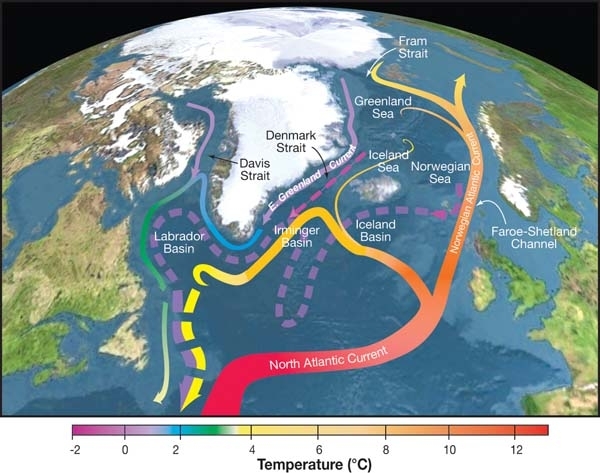AMOC collapse: Understanding the Risks, Impacts, and Solutions
Recent research indicates that the Atlantic Meridional Overturning Circulation (AMOC) may face a risk of collapse this century, or even in the next few decades, with potentially catastrophic consequences. This is a continuously updated and richly quoted research overview exploring current knowledge about the risks, consequences, and potential solutions.
Click on the arrow to the left of statements for supporting quotes and citations
1. The Risk
The AMOC is a crucial part of the Earth's climate system, bringing heat to Northern and Western Europe through various ocean currents including the Gulf Stream and playing a significant role in global ocean circulation. However, it is now at risk of collapse or significant slow down which would have profound impacts on Earths' climate and weather patterns. Although understanding when the collapse may happen, or the specific risk associated with it happening is hard to predict, the outsized potential impact warrants investigation and action.

- We can’t precisely estimate the risk of a collapse, but new estimates show that the risk of an AMOC tipping point may be much higher than previously estimated.
- Some estimate there is a risk of collapse in the coming decades, even before we reach 1.5C warming. In that case, emission reductions and removals would not be sufficient to mitigate the risk. One estimate pinned it to 59% risk before 2050. Other leading researchers have put it at “50/50 this century”.
- However other research says the “involved uncertainties are too high to robustly predict tipping times.”
- We know that some of the causes of the AMOC weakening are:
- Greenland meltwater
- Arctic meltwater
- Increased precipitation due to warming
- Other meltwater
- Reduced aerosol both globally and locally (shipping fuel)
- But we can’t quantify the contribution of each cause with high certainty. More research is needed in order to get a deeper understanding of the weakening of the collapse.
- The impacts

We know the consequences of a collapse would be massive with risks of becoming truly catastrophic. Potential consequences include:
- Much lower temperatures in Northern Europe and the UK. Especially in the winter with as much as -20C colder in some areas.
- Large-scale disruption of farming. One study estimates more than half of the suitable land for wheat and maize could be lost, mainly due to lower precipitation.
- Lower precipitation in the northern hemisphere.
- Moving of the tropical rainbelt over southern Sahel. Resulting in potentially drastically lowered food production in an area inhabited by over 150 million people.
- Disruption to the Indian summer monsoon.
- Rising sea levels on the US East Coast.
- Other unknown effects on global weather.
- A slowdown of CO₂ uptake of the ocean
Click on arrows next to statements for quotations
- The solutions
Solutions that could reduce the risk of AMOC collapse exist, but our knowledge of them is limited. Partial solutions include:
- Limiting warming to 1.5C with reductions and removals, keeping temperature overshoot of 1.5C as short as possible. This is a long-term solution, but does not address the risk of a tipping point in the next few decades.
- Marine Cloud Brightening (MCB). Either global, or regional over Greenland and the Arctic. There is some evidence of MCB being effective, but much more research is needed.
- Stratospheric aerosol injection (SAI). Modelling shows that SAI could stop the weakening of the AMOC but there are large unknowns and need for more research.
- Change the fuel mandate and Introduce sulphur fuel over the Atlantic Ocean again.
- Reduce contrails of aviation.
- Solutions that seem unlikely to work includes: Snow preservation, pumping cold water to the surface, preventing ice sheets to break off.
Click on arrows next to statements for quotations
What do we need to do today?
Besides enhanced efforts on emission reductions and removals, we need a coordinated, international research effort supported by multiple governments, international agencies, private research institutions, and philanthropic organizations, including those beyond the climate community.
Activities could include:
- Establishing an international body or working group dedicated to assessing near-term AMOC risks and to monitoring AMOC indicators in real-time.


